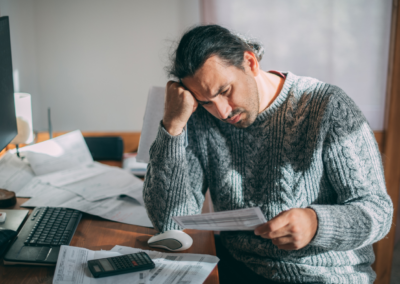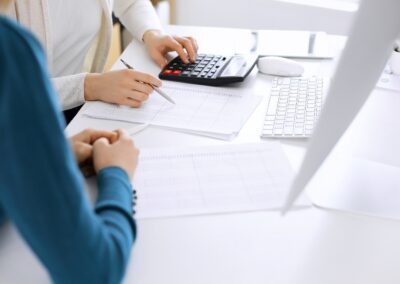It is that time of the year again, tax season. You may be weighing the decision of filing for bankruptcy or a proposal l and wondering, what about my taxes? Is tax debt dischargeable by declaring bankruptcy or filing a proposal? Will I lose my government refunds?
Crowe MacKay & Company’s Licensed Insolvency Trustees in Vancouver and Surrey are here to help you understand the tax implications of filing for bankruptcy or a consumer proposal. If you require assistance, contact our team to start your debt relief journey.
How Your Taxes are Impacted in Canada
Bankruptcy
In Canada, the majority of tax debt, including personal income tax debts, directors liabilities, and GST debts, are dischargeable by filing for bankruptcy. The Stay of Proceedings that goes into effect when bankruptcy is filed also applies to the Canada Revenue Agency (CRA), meaning no further collection action can be taken. Tax debt incurred right up to the date of the filing of the bankruptcy is included; however, the debtor is liable for any tax debt that should occur after the date of filing the bankruptcy. The Canada Revenue Agency (CRA) has the right to offset any refunds from the periods prior to the bankruptcy against any of the pre-bankruptcy debt. This holds true even in cases where taxes are reassessed years later resulting in tax refunds.
With respect to a consumer proposal, the CRA ranks as an unsecured creditor for most tax related debt. Similar to bankruptcy, tax debt covered by a proposal includes all debt right up to the date of the filing of the proposal, the CRA retains the right to offset any pre-proposal tax refunds against the debt.
Filing Your Canadian Tax Return and Creditors
Bankruptcy
One of the required duties of a bankrupt is to provide the Licensed Insolvency Trustee (LIT) with their tax information for the year of the bankruptcy and the preceding year, if not already completed. The LIT ensures the taxes are filed in a timely manner. The income tax returns for the year in which the bankruptcy is filed are broken down into two periods, pre-bankruptcy and post-bankruptcy. If there is no tax debt, any tax refunds for the year of the bankruptcy and any preceding years will be sent directly to the LIT as property of the bankruptcy for the benefit of the creditors. Failure of the bankrupt to provide the Trustee with the required income tax information may result in an opposition to their discharge from bankruptcy.
Consumer Proposal
At the time of filing a proposal, all tax returns must be filed up to that date. If it is applicable, the LIT will file a provision tax return for the period prior to the date of the proposal in the year that the proposal is filed. If a debtor does not have any tax debts, they will continue to file their taxes normally, any refunds will be paid to them directly. Until the completion of the proposal terms, the debtor is responsible to file their personal income tax returns each year and, if applicable, pay any taxes owing.
Be Aware: The prescribed rate was raised to 8% in the first quarter of 2023. This means that until you have the protection of a Stay of Proceedings that comes with filing a bankruptcy or proposal, interest on overdue taxes will now be charged at the increased rate.
Receiving Tax Refunds and GST Credits from the Canadian Government
Bankruptcy
In the course of the bankruptcy, the tax refunds, GST Credits, and the BC Climate Action Tax Credit (BCCATC) distributed by the government will be issued directly to the LIT. Tax refunds and BCCATC credits are property of the bankruptcy for the benefit of the creditors. GST Credits only constitute property in the bankruptcy if no dividends are available to the creditors (Rule 59, Bankruptcy and Insolvency Act). Should the bankruptcy receive enough receipts to make a dividend available, the GST credits being held will be returned to the bankrupt. Once the bankrupt has been discharged and the LIT has closed the file, the GST credits will be sent directly to the taxpayer once again. A bankruptcy does not effect the debtor receiving Child Tax Benefits or Pensions.
Proposal
During the duration of a proposal, all tax refunds and credits will be sent directly to the taxpayer, the LIT has no interest in them.
Exemptions for Tax Debt in Bankruptcy and Proposal’s
Certain tax debts can survive a bankruptcy or a proposal. The exemptions are any debt that could be subject to a demand under subsection 224(1.2) of the Income Tax Act of Canada or under any substantially similar provision of provincial legislation.
What is the Difference Between Bankruptcy and Consumer Proposals?
Still trying to determine which option is right for you?
A bankruptcy is a legal proceeding governed by the Bankruptcy and Insolvency Act which is designed to discharge most debts and give an honest debtor a fresh financial start. Learn more
A consumer proposal is a formal, legally binding agreement administered by a LIT which, with the agreement of the creditors, allows a debtor to repay a percentage of their debt over a fixed period of time, reducing their debt load to a manageable amount. Learn more
Require Assistance?
At Crowe MacKay & Company, we have over 60 years of experience and offer free initial consultations. If you have any questions regarding the information above, contact our office today and start your debt relief journey.
Follow us on Facebook to get article updates directly to your feed.
This article has been published for general information. You should always contact your trusted advisor for specific guidance pertaining to your individual needs. This publication is not a substitute for obtaining personalized advice.
If you require corporate or personal Insolvency services, Crowe MacKay & Company provides custom solutions for clients, allowing them to live debt-free.





